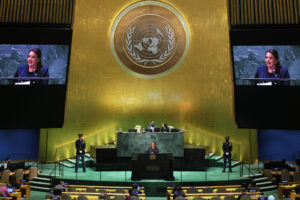“Comments about the upcoming Salvadoran presidential elections made in the last week by a number of members of the US Congress stepped over the line”, said Geoff Thale, Program Director at the Washington Office on Latin America. “While the US Embassy has been careful not to take sides in this election, these members of Congress seem to be trying to influence the outcome.” The comments recall an unfortunate history in which the United StatesEl Salvador this Sunday, March 15th. The elections are expected to be very close, with Mauricio Funes, the candidate of the FMLN, the party of the former guerrillas, competing vigorously with Rodrigo Ávila, the candidate of the conservative, ruling ARENA party. attempted to use its political influence to shape how Salvadorans voted. Presidential elections will take place in El Salvador this Sunday, March 15th. The elections are expected to be very close, with Mauricio Funes, the candidate of the FMLN, the party of the former guerrillas, competing vigorously with Rodrigo Ávila, the candidate of the conservative, ruling ARENA party.
WOLA was critical of the ways in which some members of the US Congress expressed their concern about elections in El Salvador. In a letter sent to Secretary of State Hillary Clinton on March 4th, Rep. Lincoln Diaz-Balart (R-FL) and 45 other members of Congress commented on the political views of the Salvadoran candidates, rather than on the electoral process. The letter asserts that FMLN candidate Funes’ “actions and declarations confirm the FMLN extremism.” The letter asks Secretary Clinton to keep an eye on “potential threats to our security interests” warning that a FMLN victory could mean alliances between El Salvador with the regimes of Venezuela, Iran, Cuba and other states that promote terrorism. Following the letter, on March 11th, several members of the House made floor speeches in which they repeated the message of the Diaz-Balart letter. Among them, Representative Dana Rohrabacher (R-CA), who spoke at a congressional hearing yesterday, warned of “consequences” if the FMLN won the presidency, suggesting that the US would need to consider a “radical termination” of nearly 4 billion dollars in remittances Salvadorans in the United States send to their families at home if Funes were elected.
“These are scare tactics, probably intended to influence Salvadoran voters;” said Thale “they are erroneous as well. The US government has said publicly, under both the Bush and the Obama Administrations, that it will accept and work with whomever the Salvadoran people elect. No one should worry that US-Salvadoran relations will change because of who wins these elections.”
Maureen Meyer, WOLA associate for Mexico and Central America noted that comments such as these undermine stated US neutrality, Meyer expressed alarm at the “blatant disconnect between the US government’s position and these comments from some members of Congress.” In a newly released memo, Meyer urged the State Department to immediately and publicly reiterate its view that United States government does not seek to interfere in the Salvadoran elections.
To read the newly released WOLA memo click here.
Addendum
Late in the day on March 12th, after our statement was distributed, the State Department posted the following statement on the US Embassy’s website:
US Government Position Regarding El Salvador’s Presidential Election .
The statement reiterates the US government’s official position of neutrality in Sunday’s elections. Please take this statement into account in any reporting you may do concerning Sunday’s elections.
Contact:
Geoff Thale, Program Director
202-797-2171


